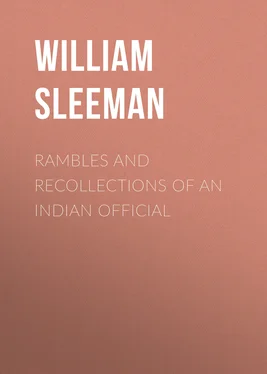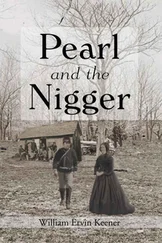William Sleeman - Rambles and Recollections of an Indian Official
Здесь есть возможность читать онлайн «William Sleeman - Rambles and Recollections of an Indian Official» — ознакомительный отрывок электронной книги совершенно бесплатно, а после прочтения отрывка купить полную версию. В некоторых случаях можно слушать аудио, скачать через торрент в формате fb2 и присутствует краткое содержание. Жанр: Путешествия и география, История, foreign_edu, foreign_antique, foreign_prose, на английском языке. Описание произведения, (предисловие) а так же отзывы посетителей доступны на портале библиотеки ЛибКат.
- Название:Rambles and Recollections of an Indian Official
- Автор:
- Жанр:
- Год:неизвестен
- ISBN:нет данных
- Рейтинг книги:4 / 5. Голосов: 1
-
Избранное:Добавить в избранное
- Отзывы:
-
Ваша оценка:
- 80
- 1
- 2
- 3
- 4
- 5
Rambles and Recollections of an Indian Official: краткое содержание, описание и аннотация
Предлагаем к чтению аннотацию, описание, краткое содержание или предисловие (зависит от того, что написал сам автор книги «Rambles and Recollections of an Indian Official»). Если вы не нашли необходимую информацию о книге — напишите в комментариях, мы постараемся отыскать её.
Rambles and Recollections of an Indian Official — читать онлайн ознакомительный отрывок
Ниже представлен текст книги, разбитый по страницам. Система сохранения места последней прочитанной страницы, позволяет с удобством читать онлайн бесплатно книгу «Rambles and Recollections of an Indian Official», без необходимости каждый раз заново искать на чём Вы остановились. Поставьте закладку, и сможете в любой момент перейти на страницу, на которой закончили чтение.
Интервал:
Закладка:
The quotation is from The Task , Book II, line 161.
159
Sādī (Sa'dī) is the poetic name, or nom de plume , of the celebrated Persian poet, whose proper name is said to have been Shaikh Maslah-ud-dīn, or, according to other authorities, Sharf-ud-dīn Mislah. He was born about A.D. 1194, and is supposed to have lived for more than a hundred years. Some writers say that he died in A.D. 1292. His best known works are the Gulistān and Būstān . The editor has failed to trace in either of these works the couplet quoted. Sādī says in the Gulistān , ii. 26, 'That heart which has an ear is full of the divine mystery. It is not the nightingale that alone serenades his rose; for every thorn on the rose-bush is a tongue in his or God's praise' (Ross's translation).
160
November, 1835.
161
Spelled Dhamow in the author's text. The town, the head- quarters of the district of the same name, is forty-five miles east of Sāgar, and fifty-five miles north-west of Jabalpur. The C. P. Gazetteer (1870) states the population to be 8,563. In 1901 it had grown to 13,335; and the town is still increasing in importance ( I. G. , 1908). Inscriptions of the fourteenth and fifteenth centuries at Damoh are noticed in A. S. R. , vol. xxi, p. 168.
162
The guinea-worm (Filaria medinensis ) is a very troublesome parasite, which sometimes grows to a length of three feet. It occurs in Africa, Arabia, Persia, and Turkistan, as well as in India.
163
The Dhīmars (Sanskrit dhīvara , 'fisherman') are the same caste as the Kahārs, or 'bearers'. The boats used by them are commonly 'dugout' canoes, exactly like those used in prehistoric Europe, and now treasured in museums.
164
In the author's time the rupee was worth two shillings, or more, that is to say, the ninth or tenth part of a sovereign. After 1873 the gold value of the rupee fell, so that at times it was worth little more than a shilling. Since 1899 special legislation has succeeded in keeping the rupee practically steady at 1s. 4d. In other words, fifteen rupees are the legal equivalent of a sovereign, and a hundred rupees are worth £6 13s. 4d.
165
A town on the Allahabad and Sāgar road, sixty-one miles north-east of Sāgar. It was the head-quarters of the Damoh district from 1818 to 1835.
166
The chief town of the district of the same name in Bundēlkhand, situated on the Kēn river, ninety-five miles south-west from Allahabad.
167
Worth at that time £450 sterling, or a little more.
168
An unusual mode of procedure for professed Thugs to adopt, who usually strangled their victims with a cloth. Faringia (Feringheea) Brahman was one of the most noted Thug leaders. He is frequently mentioned in the author's Report on the Depredations committed by the Thug Gangs (1840), and the story of the Sujaina crime is fully told in the Introduction to that volume. Faringia became a valuable approver.
169
Lieutenant Brown was suddenly called back to Jubbulpore, and could not himself go to Sujaina. He sent, however, an intelligent native officer to the place, but no man could be induced to acknowledge that he had ever seen the bodies or heard of the affair, though Faringia pointed out to them exactly where they all lay. They said it must be quite a mistake—that such a thing could not have taken place and they know nothing of it. Lieutenant Brown was aware that all this affected ignorance arose entirely from the dread these people have of being summoned to give evidence to any of our district courts of justice; and wrote to the officer in the civil charge of the district to request that he would assure them that their presence would not be required. Mr. Doolan, the assistant magistrate, happened to be going through Sujaina from Sāgar on deputation at the time; and, sending for all the respectable old men of the place, he requested that they would be under no apprehension, but tell him the real truth, as he would pledge himself that not one of them should ever be summoned to any district court to give evidence. They then took him to the spot and pointed out to him where the bodies had been found, and mentioned that the body of the tanner had been burned by his friends. The banker, whose treasure they had been carrying, had an equal dislike to be summoned to court to give evidence, now that he could no longer hope to recover any portion of his lost money; and it was not till after Lieutenant Brown had given him a similar assurance, that he would consent to have his books examined. The loss of the four thousand five hundred rupees was then found entered, with the names of the men who had been killed at Sujaina in carrying it. These are specimens of some of the minor difficulties we had to contend with in our efforts to put down the most dreadful of all crimes. All the prisoners accused of these murders had just been tried for others, or Lieutenant Brown would not have been able to give the pledge he did. [W. H. S.] Difficulties of the same kind beset the administration of criminal justice in India to this day.
170
Of the Marāthās. The district was ceded in 1818.
171
More correctly written Mughal. The term is properly applied to Muhammadans of Turk (Mongol) descent. Such persons commonly affix the title Beg to their names, and often prefix the Persian title Mīrzā.
172
Meerut, the well-known cantonment, in the district of the same name. The name is written Meeruth by the author, and may be also written Mīrath. Ghāt (ghaut) means a ferry, or crossing- place. Murādābād and Bareilly (Barelī) are in Rohilkhand. The latter has a considerable garrison. Both places are large cities, and the head-quarter of districts.
173
The bow and quiver are now rarely seen, except, possibly, in remote parts of Rājputāna. A body of archers helped to hold the Shāh Najaf building at Lucknow against Sir Colin Campbell in 1858. Even in 1903-4 some of the Tibetans who resisted the British advance were armed with bows and arrows.
174
An inn of the Oriental pattern, often called caravanserai in books of travel.
175
Then the capital of Ranjit Singh, the great Sikh chief.
176
'This is commonly given either by the leader of the gang or the belhā , who has chosen the place for the murder.' It was usually some commonplace order, such as 'Bring the tobacco' ( Ramaseeana , p.99, &c.). See also Meadows Taylor, Confessions of a Thug .
177
The Jamāldehī Thugs resided 'in Oude and some other parts east of the Ganges. They are considered very clever and expert, and more stanch to their oath of secrecy than most other classes' (ibid. p. 97). At the time referred to Oudh was a separate kingdom, which lasted as such until 1856. A map included in the printed Thuggee papers reveals the appalling fact that the Thugs had 274 fixed burying-places for their victims in the area of the small kingdom, about half the size of Ireland.
178
Fakīr (fakeer), a religious mendicant. The word properly applies to Muhammadans only, but is often laxly used to include Hindoo ascetics.
179
So called because the poison they use is made of the seeds of the 'datura' plant (Datura alba ), and other species of the same genus. It is a powerful narcotic.
Читать дальшеИнтервал:
Закладка:
Похожие книги на «Rambles and Recollections of an Indian Official»
Представляем Вашему вниманию похожие книги на «Rambles and Recollections of an Indian Official» списком для выбора. Мы отобрали схожую по названию и смыслу литературу в надежде предоставить читателям больше вариантов отыскать новые, интересные, ещё непрочитанные произведения.
Обсуждение, отзывы о книге «Rambles and Recollections of an Indian Official» и просто собственные мнения читателей. Оставьте ваши комментарии, напишите, что Вы думаете о произведении, его смысле или главных героях. Укажите что конкретно понравилось, а что нет, и почему Вы так считаете.












